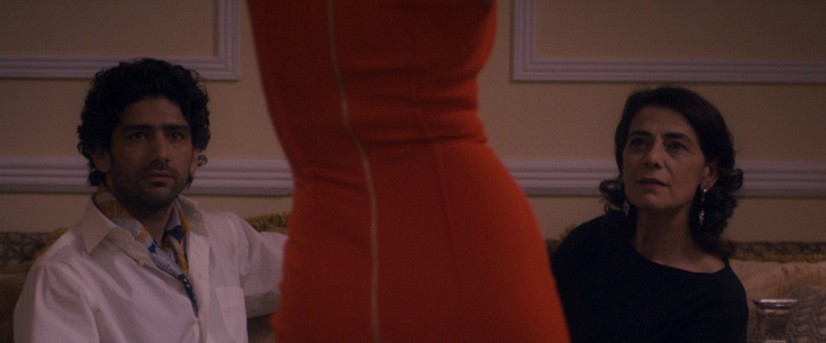Raja Amari’s previous features include “Satin Rouge” and “Buried Secrets.” She was born in Tunis and completed a Master’s degree in French literature at the University of Tunis, and studied cinema at La Fémis in France.
“Foreign Body” will premiere at the 2016 Toronto International Film Festival on September 14.
W&H: Describe the film for us in your own words.
RA: I wanted to draw the portrait of an immigrant and her struggle to survive from an intimate perspective. I wanted to depict two female immigrants drawn [together] in a shady relationship [tied to] desire and rejection that evolves in an unexpected way. They are both fragile and strong in [the midst of] political and social turmoil. It’s a film about shifting borders and identities, both realistic and fantasized.
W&H: What drew you to this story?
RA: It’s not an autobiographical movie, but I have been an immigrant myself, and I wanted to represent this experience in its complexity.
To move from a territory to another is a way to stay alive, to renew oneself, and to find one’s own identity. Beside the politico-social reasons for moving, there are always private and sometimes unmentionable reasons.
W&H: What do you want people to think about when they are leaving the theater?
RA: I want the spectator to be immersed in a human experience and to follow, beyond the context of being an illegal immigrant, the story of an individual struggling and adapting himself to a chaotic new life where he is not only a victim but somebody also capable of treason in order to survive at all costs.
W&H: What was the biggest challenge in making the film?
RA: This film was a long process. It took several years to be financed. I would say that the biggest challenge was to keep the desire intact and to adapt to various changes that circumstances called for.
Never give up despite the disappointments and discouraging obstacles.
W&H: How did you get your film funded? Share some insights into how you got the film made.
RA: The film is a co-production between Tunisia and France. It was shot in both countries. It is mainly financed by public funds: in Tunisia there is a fund from the ministry of culture. In France we had money from the CNC (National Centre for Cinema and the Moving Image) and the region of Rhone Alpes. There are also some private funds such as CINE+.
In France, there is an openness to the world and to foreign cinema. An important number of foreign movies are financed by public money.
Q&H: What does it mean for you to have your film play at TIFF?
RA: It’s an amazing opportunity that allows a wide exposure for the film and for my future perspectives.
W&H: What’s the best and worst advice you’ve received?
RA: The best: “Work with friends.”
That’s what I did in this film. I worked mainly with people I both trusted and esteemed. I worked with many people who studied with me in cinema school. It happens that they are also very talented. I think it’s important to communicate and to share with the team in a common sensitivity. I have three amazing actors and despite the tension inherent to the tight budget we worked with mutual trust and enthusiasm.
The worst advice: “Find a star and you will get your film financed in no time.”
I think the most important thing is to have the right actors — the appropriate crew that appreciates your work, that trusts you, and which you can easily communicate with.
If not, that could put a brake on your impulse and energy and that would reflect badly on the film and the creative process.
W&H: What advice do you have for other female directors?
RA: Be stubborn. But also be flexible.
Trust your instincts. You know why certain things must be done in a certain way. This is your uniqueness. Resist all the pressure — at the end, you won’t regret-it.
Be open at the same time to the [what might] feed your creativity. Pay attention to your crew members’ perception.
The capacity to size the instant and the unexpected things that happen in the set is essential.
W&H: Name your favorite woman-directed film and why.
RA: I would say Andrea Arnold is my favorite female director. She has a singular talent devoid of concessions. She manages to reconcile a social realistic approach with a poetic cinematography. I admire the energy emanating from her characters, especially the female ones, and I love her sensual and physical way of filming.
Among the French woman directors I would name Lucile Hadzihalilovic, whose work is both daring and formally amazing.
W&H: Have you seen opportunities for women filmmakers increase over the last year due to the increased attention paid to the issue? If someone asked you what you thought needed to be done to get women more opportunities to direct, what would be your answer?
RA: Yes, there is definitely more attention paid to the women directors’ work and their presence in important film festivals is growing. However, the proportion of women among the directors is still very weak.
The cinema is just one of the many domains where women are under-represented. The issue is linked to a global social and political situation that still goes against the emancipation of women, especially in the countries where they are deprived of their basic rights.







